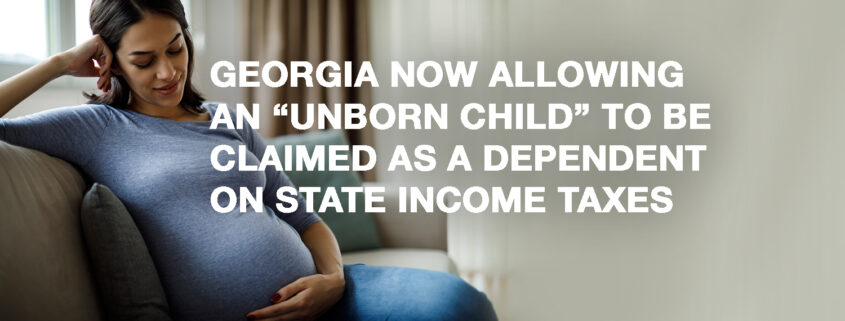Georgia Allowing An ‘Unborn Child’ To Be Claimed As A Dependent On State Income Taxes
Georgia Allowing An ‘Unborn Child’ To Be Claimed As A Dependent On State Income Taxes
On August 1, 2022 The Georgia Department Of Revenue announced that Georgia residents filing their 2022 tax returns who had fetuses with detectable heartbeats at six weeks of pregnancy can claim a dependent personal exemption in the amount of $3,000.00.
The announcement follows the US Supreme Court’s landmark decision overturning Roe v. Wade, eliminating the federal constitutional right to abortion, and the subsequent ruling by the 11th Circuit Court of Appeals that allowed a Georgia law banning abortions as early as six weeks of pregnancy to take effect. The “Living Infants Fairness And Equality (LIFE) Act” Georgia House Bill 481, was signed into law by Republican Governor Brian Kemp in 2019; but then a federal judge ruled it unconstitutional and blocked it. However, after Roe v. Wade was overturned, the federal appeals court allowed it to take effect. Under Georgia law, embryos are considered “natural persons” with “full legal recognition” and “shall be included in certain population based determinations.”
After the ruling, the definition of a dependent in Georgia was amended to include an “unborn child” with a detectable heartbeat — effective the date of the federal appeals court’s July 20, 2022 ruling, the Department of Revenue said.
It is unclear what documents taxpayers will need to show to support the dependent deduction claimed. Also, it is unclear how the tax filings will play out for pregnancies that do not come to term, or how it affects surrogates and unmarried parents living separately. The Department of Revenue said guidance will be issued later this year.
Georgia’s Position Contrary To The Federal Internal Revenue Code (“IRC”)
IRC Sec. 152 defines a dependent as a “qualifying child” or a “qualifying relative”. The Code goes on to define a child as an individual who is a son, daughter, stepson, or stepdaughter of the taxpayer, or an eligible foster child of the taxpayer, or a legally adopted individual of the taxpayer who under such adoption is a son, daughter, stepson, or stepdaughter of the taxpayer.
Under such definition, it should be apparent that to meet this standard the individual had to be born.
Since the 2017 Tax Cuts And Jobs Act did away with personal exemptions for dependents, the number of dependents you can claim for Federal income tax purposes will not impact your Federal income tax return but many States still allow taxpayers to claim personal exemptions for dependents on State income tax returns.
Normally States will conform or follow their State income tax laws to the Federal Internal Revenue Code; however, States can deviate from Federal law in enacting a State’s own income tax laws. What remains to be seen is if other States enact laws treating unborn children as natural persons, will they follow Georgia’s tax law allowing taxpayers to claim an unborn child as a dependent for State income tax purposes.
What Should You Do?
You know that at the Law Offices Of Jeffrey B. Kahn, P.C. we are always thinking of ways that our clients can save on taxes. If you are selected for an audit, stand up to the IRS by getting representation. Tax problems are usually a serious matter and must be handled appropriately so it’s important to that you’ve hired the best lawyer for your particular situation. The tax attorneys at the Law Offices Of Jeffrey B. Kahn, P.C. located in Orange County (Irvine), the San Francisco Bay Area (including San Jose and Walnut Creek) and elsewhere in California are highly skilled in handling tax matters and can effectively represent at all levels with the IRS and State Tax Agencies including criminal tax investigations and attempted prosecutions, undisclosed foreign bank accounts and other foreign assets, and unreported foreign income. Also if you are involved in cannabis, check out what a cannabis tax attorney can do for you and if you are involved in crypto-currency, check out what a Bitcoin tax attorney can do for you.


 Follow
Follow Follow
Follow
